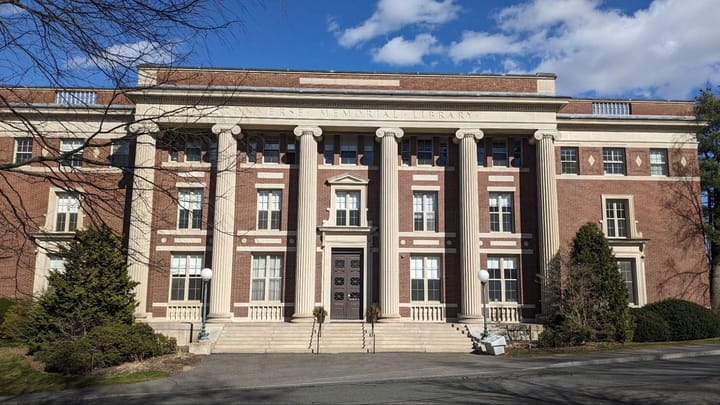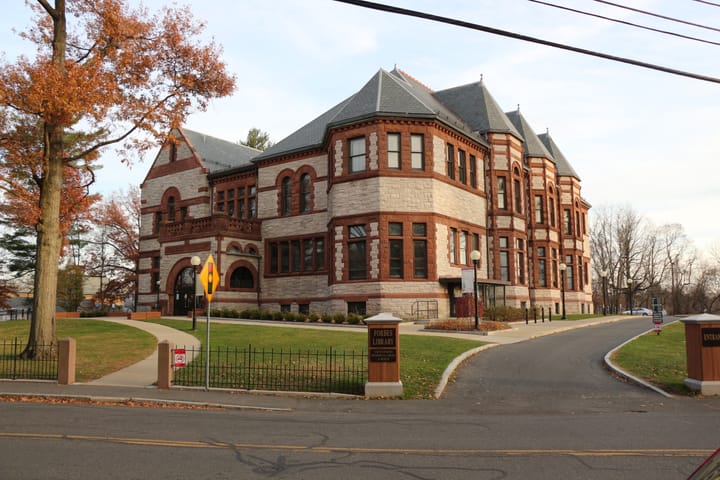Khalidi Continues Palestine/Israel Series, Asks “Why Do We Care?”
In the second part of his three-part lecture series, Dr. Ahmad Samih Khalidi analyzed the forces that have kept the Palestine-Israel conflict in the news cycle for decades, including Jerusalem’s status as a holy land for three world religions and the region as a geopolitical crossroads.
Dr. Ahmad Samih Khalidi returned to campus for the second event of a three-part series discussing the historical origins and present-day ramifications of the Israel-Palestine conflict, speaking again to a packed room in the Lyceum on Feb. 28. He focused his lecture on the reasons why the Israel-Palestine conflict has captured worldwide attention.
This talk was titled “Palestine/Israel: Why Do We Care? Historical Resonances, Domestic Fractures, Global Consequences.” Khalidi spoke from his expertise not only as an associate fellow at the Center for Security Policy but also as a former negotiator. Professor of History and Asian Languages and Civilizations Monica Ringer introduced Khalidi, emphasizing the breadth of the organizations who sponsored the event. “This [series] has been enthusiastically and generously supported from the beginning,” she said.
Khalidi began the talk by explaining the importance of Jerusalem for the three Abrahamic religions, as well as the city’s economic and political significance to the entire world.
“The centrality of Jerusalem is drenched in the faith of all three monotheisms,” he said. “No other place on Earth bears such sacred weight … [It is] a land that is folded into the daily practices of millions of people, into their faith, and sense of identity.”
Besides religious significance, Jerusalem has also been of vital strategic importance for “would-be conquerors of the Levant” — at the crossroads of three continents. He linked the Balfour Declaration — the British government’s statement of support for a Jewish state in the Middle East — to Britain’s 20th century militaristic aims, emphasizing the region’s long history of conflict as various empires have vied for power.
Khalidi also attributed much of the interest in the Israel-Palestine conflict to the United States’ long-standing relationship with Israel. John Adams, he noted, believed that there should be a Jewish state over a century before 1948 — however, it was because he believed that Jewish people would convert to Christianity if they had their own nation.
Support for a Jewish state has only increased since Israel’s founding.
“No other foreign leader, besides Winston Churchill, has had the pleasure of congressional embrace such as [Israeli Prime Minister] Benjamin Netanyahu,” he said. “The US’s institutional commitment to Israel appears unwavering.”
In response to an audience question asked at the end of the talk, Khalidi also highlighted president Joe Biden’s declaration that he was a Zionist. Although other U.S. presidents may have been Zionists in practice, he said, Biden’s self-identification with the term was distinct and reflected the fact that “Washington remains Israel’s perpetual guardian.”
However, despite the Israeli government’s close alliance with the U.S., Khalidi noted that the Palestinian struggle has had a “profound impact on people’s consciousness.”
“We have made giant strides in Western academia,” he said, “that no amount of hasbara [Israeli propaganda] has succeeded in neutralizing.”
He discussed Palestinian media representation and historical examples of Black-Palestinian solidarity, exemplified in Malcolm X’s 1964 visit to Gaza. Similarly, he noted that progressive Jewish groups have opposed the war in Gaza. He said that their work “has kept the flame of hope alive”.
The recent war in Gaza has deepened the divide between the Global North and the Global South, Khalidi said, pointing to reverberations of the current war in India, Italy, Brazil, Argentina, Germany, and South Africa. The Global South has generally been less supportive of the Israeli military operation in Gaza — exemplified in South Africa’s charge of genocide against the country — while countries in the Global North like Germany have firmly allied themselves with Israel.
He also challenged the claim that Israel is held to an unfair standard. He argued that Israel, through its claims to be the ‘only democracy in the Middle East’ and to have the ‘most moral army,’ should be criticized when it fails to live up to its own aspirations.
“No other self-professed Western-style democracy today claims another people’s homeland as its own,” he said. “By such measures alone, Israel is truly exceptional, and thus warrants exceptional scrutiny.”
“The fact is that the [entire] world cares deeply about what happens in the Holy Land,” Khalidi concluded, “And neither Israel, nor the Palestinians for that matter, can escape its glare.”
In response to an audience question about dissidence and the hope of change in the plight of Palestinians (specifically Gazans), Khalidi said that “Palestinians have been resisting for over 120 years … if that light was going to be extinguished, that would have happened.” He also linked Israeli oppression in Palestine to Indian oppression in Kashmir.
Khalidi emphasized his belief that all parties are entitled to fair treatment. “For me, the central point is that there is no hierarchy of claims … There’s no one history that says everything else doesn’t count. This land should belong to those who feel attached to it, with equal measure, with equal rights,” Khalidi said. “No one’s the lord here and the rest are serfs.”
Khalidi’s second talk was as well-attended as his first, with a large crowd spilling out into the hallway. Audience member Jackson Hersom ’27 voiced his appreciation for the event. “I feel like I’m better equipped to understand the political, social, and historical context around the crisis in Palestine,” he said, “and [I’m now] able to have a reference point from somebody who actually knows what they’re talking about.”





Comments ()